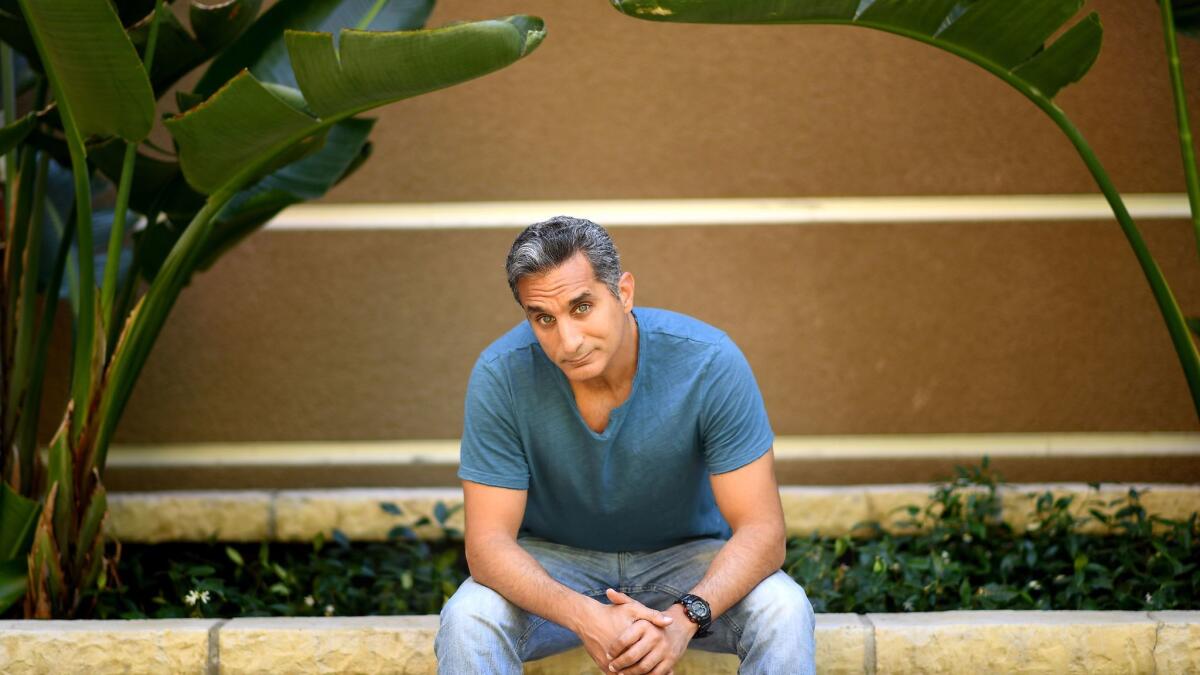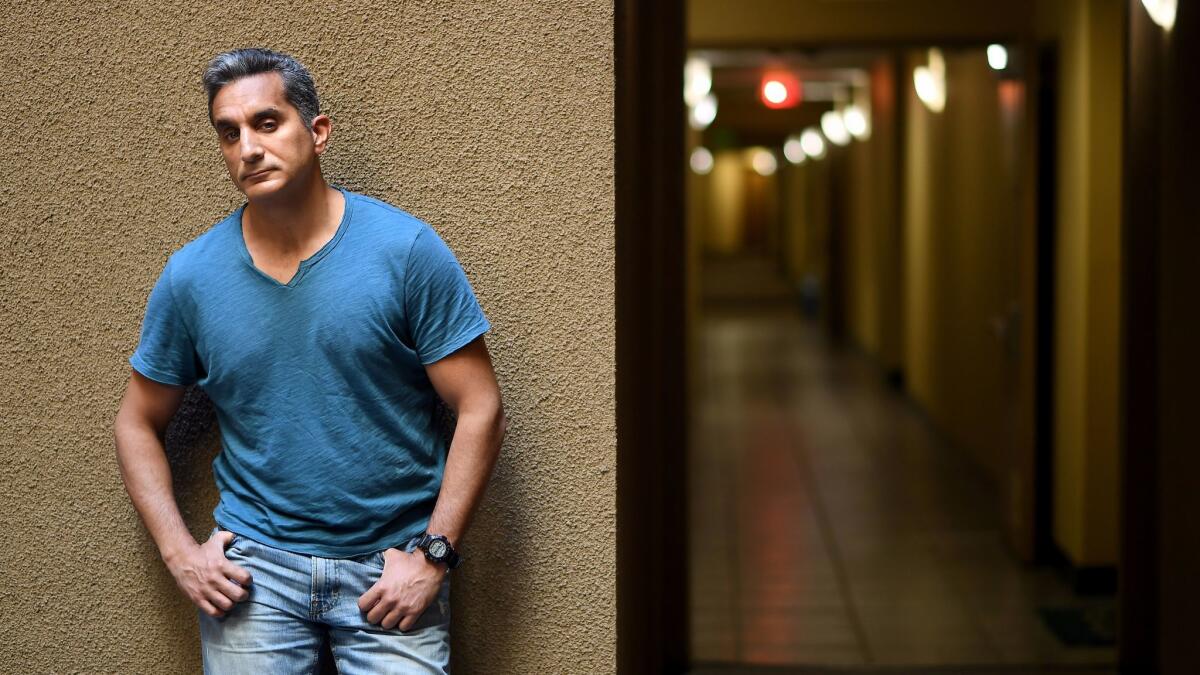‘Egypt’s Jon Stewart’ is living in exile and trying to make his satire work in America

- Share via
He lives in exile far from the revolution and time that made him famous.
Out near La Brea, drizzle blows through jacaranda, a gardener hurries past a pool. Bassem Youssef sips coffee, craving a mango from Egypt, his homeland, where from a laundry room in his apartment he started a political satire show that captured the passion of the 2011 uprising and turned him into one of the most influential voices in the Middle East.
That’s over, at least for a while. Death threats and pressure from the military-backed government of President Abdel Fattah Sisi forced him to flee Cairo. Now, at 43, Youssef, a former heart surgeon, is taking acting classes, arranging meetings with agents and producers, working on his elocution, writing scripts and seeking reinvention in a new city that is at once fantastical and cruel.
My rise to stardom in Egypt by any measure was not logical. I’m now living a normal life. I have no illusions that the door will be thrown open for me.
— Bassem Youssef
“In the Arab world I could snap my fingers and say I want to do a TV show tomorrow and they’d be lining up,” he says. “But here I’m just a guy who comes from a different country trying to make it. I’m living the L.A. life of everyone who has ‘projects’.” He laughs. “My rise to stardom in Egypt by any measure was not logical. I’m now living a normal life. I have no illusions that the door will be thrown open for me.”
He comes with the calling cards of a man whose odyssey began with the stirrings of placards and tanks. The cover of his new memoir — “Revolution for Dummies” — is a distillation of his humor and the competing agendas that imperil the Middle East: a winking emoji wearing an Islamist beard and a general’s hat. A documentary about him, “Tickling Giants”, directed by Sara Taksler and released this month on Blu-ray and VOD, examines his rise and fall.
“Everything has been taken from me. My home, parents, work, success. I find myself an outcast,” he says. “It is very frustrating to see the destruction of my country. The destruction of its economy, its social structure. The destruction of compassion and empathy for standing up for what’s rights. The destruction of freedoms and one of the best generations Egypt has ever had. The destruction of the Egyptian spirit.”
That spirit propelled the “Arab Spring,” which swept the Middle East and North Africa and brought Youssef out of the operating room and into the spotlight. His program — “The Show” — lampooned and angered the forces that were reshaping the region. It was a YouTube sensation, racking up 5 million viewers in the first few months. It was picked up by a station and became the most watched program in the country, reaching an estimated 40% of Egypt’s population.
“I love sarcasm,” he says in “Tickling Giants.” “It allows me to cut through people’s facades without spilling any blood.”
He was dubbed the “Jon Stewart of Egypt.” He appeared on Stewart’s “Daily Show” and Stewart reciprocated by traveling to Cairo in 2013. Youssef, a blue-eyed prankster with a fierce intellect, embodied the verve and defiance of a protest movement that arose from decades of authoritarian corruption. An impeccably tailored mercurial antagonist, Youssef, who was tear-gassed during protests in Tahrir Square, sang and danced, and tossed out one-liners at those in charge.
It was a shifting cast of characters: President Hosni Mubarak was toppled after 18 days of demonstrations. The military took charge. The Muslim Brotherhood won elections and governed until the military overthrew Islamist President Mohamed Morsi and Sisi, a general, became the new leader. In 2013, after mocking Morsi — he made fun of his hat — the comedian was arrested for insulting Islam and the president. He was released, but when Sisi and the army came to power — Youssef riffed on a military claim to have found the cure for AIDS — there was even less tolerance for dissident humor.
The government jammed his TV signal and sent protesters to his offices. He faced death threats and his former station sued him for about $10 million. He packed a bag and fled to Dubai and recently moved to Los Angeles. His parents died while he was in exile and his country is threatened by Islamic State, a downward spiraling economy and a government that “disappears” those against it.
Youssef these days is refining his brand of parody as an antidote for America’s fractious politics and the missteps of President Trump’s administration. He hosts “Democracy Handbook,” a Fusion TV show that sends him across the country to satirize, cajole and make fun of his adoptive land. Seen through the eyes of an outsider who is at once ingratiating and shrewd, the skits include Youssef attending a Trump rally, a gun show and venturing to Flint, Mich., to mock stricter U.S. immigration policies by suggesting that the best way to keep foreigners out is to frighten them with cities in despair.
“As an immigrant, I’m part of the problem,” he chides on the Flint show. “So, I thought if I could just help solve the problem maybe after Trump’s wall goes up, he’ll let me stay on the side with all the outlet malls and reliable Wi-Fi. Here’s the problem. You’re (America) selling yourself too well…. Why not take a tip from my part of the world, where everything is falling apart.”
Youssef is looking for a niche in an entertainment industry already stacked with talents like Stephen Colbert, John Oliver, Seth Meyers and others. “I wonder what can I add to this,” he says. “I don’t want to be a novelty. My fear is I will not be up to par, that I won’t be a commodity people invest in.”
His aim is to develop a show of social commentary and satire with international scope and a deeper focus on the Arab world. “Nobody is really dissecting it,” says Youssef, whose wife and young daughter moved to Los Angeles with him. “I want to bring that kind of perspective. It affects American politics and the day-to-day life of people here.”
It is a strange, unsettling time across much of the planet. From Britain to the U.S. to the Philippines, populism has shaken the political order and alliances are being redrawn. The “Arab Spring” revolts rattled the old guard, but, except for Tunisia, didn’t bring about anything resembling democracy. Ideologies have since hardened worldwide, whether they are peddled by religious leaders, military men or populists and nationalists like Trump and Russian President Vladimir Putin. Youssef says a dangerous symmetry is emerging.

There are the parallels between Sisi supporters, Trump supporters, right-wing supporters in Europe and Islamic supporters... Facts do not matter.”
— Bassem Youssef
“There are the parallels between Sisi supporters, Trump supporters, right-wing supporters in Europe and Islamic supporters. They all share the same thing. Facts do not matter. Ideology comes first and then I can tailor the facts based on what I think and see. These people don’t care if what they’re rooting for is a failure or evil or bad. It doesn’t matter as long as we can get back at the other side.”
But the Egyptian uprising started a deeper awareness: ”There are conversations in my part of the world that were not even imaginable 10 years ago,” Youssef says.“People are speaking about religious freedom, gender roles. Freedom to do whatever you want. This isn’t a huge wave. It’s small. It’s a minority but a critical mass minority. It’s a beginning.”
The drizzle stops falling outside, but the sky stays gray and the gardener who was working by the pool has vanished beyond the bushes. Muzak is playing. It’s one of those mornings that seem not to move. Youssef, dressed in blue and neon green workout clothes, sips coffee and speaks of Egypt’s mangos and cucumbers and the colors of market stalls. He pauses, and then mentions that he’s working on scripts for a TV series and a movie.
“L.A. is full of people writing scripts that get turned down,” he says, adding that one is a story about fear of the other. His favorite shows include “House of Cards,” “Game of Thrones” and “Westworld,” which he describes as “modern life philosophy of what our origin is. Where do we come from, and what do we think is real and what do we revere as holy?”
That’s a fitting existential question from a satirist who has excoriated the sins of the real and the holy. He smiles but beneath it is the unsure look of a man who started out one way and ended up another. The revolution veered in another direction too. The promise of change was broken by extremes. Home became someplace else, and the power of fame and the freedom of expression were little match for the designs of generals.
“It’s too much to say that I was the voice of the people or the voice of reason. Nobody can say that,” he says. “But it was taken from me overnight and nobody lifted a finger.”
See the most-read stories this hour »
Twitter: @JeffreyLAT
ALSO:
Ethan Hawke lets us in his editing room and reveals what Philip Seymour Hoffman taught him
Racing through Rome before the ticket booth goes dark and other faraway moviegoing adventures
What a play about Antonin Scalia tells us about this moment in American history
More to Read
Only good movies
Get the Indie Focus newsletter, Mark Olsen's weekly guide to the world of cinema.
You may occasionally receive promotional content from the Los Angeles Times.











